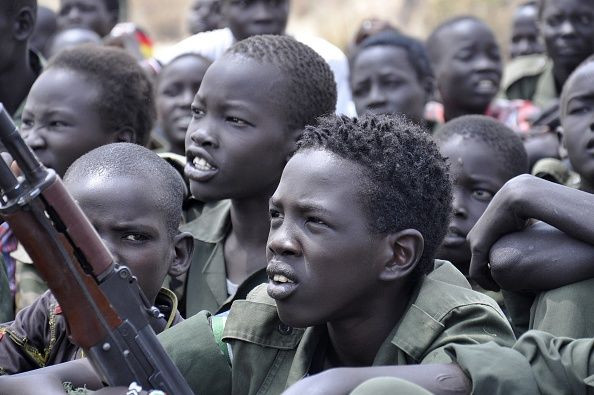Human Rights Watch Report Details Plight Of Child Soldiers In South Sudan

South Sudanese authorities should investigate and prosecute commanders who have recruited children under 18 years of age as soldiers, according to a report released Tuesday by Human Rights Watch (HRW). More than 16,000 children, predominantly between the ages of 15 and 17 years, have worked as child soldiers since the conflict in South Sudan began in 2013, the report said, citing U.N. estimates.
The HRW study, titled “‘We Can Die Too’: Recruitment and Use of Child Soldiers in South Sudan,” found that children were often physically forced onto trucks bound for battles or training camps and coerced into battle just a day or two later. The report was based on interviews with 101 child soldiers, of whom more than one-third said they were recruited at gunpoint.
"I had no experience of holding a gun before," said one boy, cited in the report, who was abducted from school by opposition forces. "They told us this is how you use it ... Then we began fighting."
Generally, boys younger than 14 years worked as cooks or bodyguards for commanders, while the older ones were recruited as child soldiers. Many of the boys who spoke to HRW said they were made to walk for days, sleep in the open and received scant medical attention in case of an injury. Only few child soldiers had received irregular salaries. None of the boys interviewed attended school and all of them said that they would prefer school to a battlefield.
The New York-based nonprofit also called for investigations into two prominent pro-government militia group leaders -- Matthew Puljang and David Yau Yau, among others for the recruitment of child soldiers.
The watchdog's report said that many young boys were conditioned to take up arms in order to protect their community and cattle in the face of frequent danger as South Sudanese civilians suffer through the brutal civil war.
"Being part of an armed group afforded them [child soldiers] some protection, and also the opportunity to fight to protect their community or to fulfill their desire for revenge for attacks or abuses," the report said.
South Sudan -- the world's youngest country -- has been in the grips of a complicated power struggle since 2013, after a failed political coup triggered fighting between forces loyal to President Salva Kiir and rebels allied with his former deputy Riek Machar. A peace deal brokered in August has reportedly done little to ease tensions, with both sides accusing the other of violations.
According to U.N estimates, nearly one in five South Sudanese has been displaced by the ongoing conflict.
“South Sudan authorities should call a halt to the massive recruitment and use of children in this conflict, which deepens the decades-old patterns of abuse,” Daniel Bekele, Africa director at HRW, said in the report.
© Copyright IBTimes 2024. All rights reserved.





















